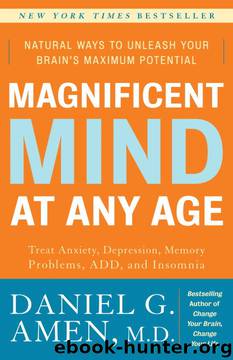Magnificent Mind at Any Age by Daniel G. Amen M.D

Author:Daniel G. Amen, M.D.
Language: eng
Format: epub
ISBN: 9780307451736
Publisher: Crown Publishing Group
Published: 2008-12-01T16:00:00+00:00
• Take great care of my current clients.
• Develop new clients.
• Spend 10 percent of my time in pro bono work.
I suggested that anything unrelated to these three goals he needed to let go. He understood the concept of total focus. He could bring his coffee to work (preferably decaf), he could limit lunch with friends to once a week, and he could allow his voice mail to screen calls from his nonpaying clients. Within a month, he was coming home earlier and spending more time with his wife and daughter. Larissa’s behavior dramatically improved. Spend time on the things that matter.
4. Know that saying no is okay. Too often, people feel anxious about saying no to someone. Many people, like me if I am not careful, are people pleasers. It bothers us when someone is upset with us, so we work hard to please others. We do not want to upset anyone. Somehow we believe that their unhappiness reflects badly on us. One concept that has helped me personally in this area I actually learned from my friend Timothy in the above story. He taught me to think in terms of “short-term pain versus long-term pain.” About the time I was helping him with Larissa, my oldest daughter asked me for another puppy. I had always had trouble saying no to her, but we had three other animals at home. When I discussed the situation with Timothy, he said, “Do you want short-term pain or long-term pain?” As he explained it, a puppy was potentially a fifteen-year decision, while saying no to Breanne was a disappointment that would likely last hours, days, or (worst-case scenario) weeks. It made so much sense, so the puppy found another home.
The principle of short-term pain versus long-term pain has helped me in many areas of my life from weight loss to relationships. When I look at the ice cream and feel hungry, I ask myself, “Is the hunger I’m feeling now (short-term pain) worth courting obesity, a condition that runs in my family (long-term pain)?” At work, if I need to fire an employee who is not working out, I often think short-term pain (the discomfort of letting someone go) versus long-term pain (the continuing hassles of having to deal with an ineffective employee). Whenever you find yourself in a quandary about what to do with an uncomfortable situation, just ask yourself, “Short-term versus long-term pain?”
5. Learn the phrase “I need to think about it. If I want to do it, I will get back to you.” So many of my patients have trouble saying no, and they impulsively say yes and end up taking on more than they can do, distracting them from their goals. Sometimes they take on so many things that they end up doing nothing. When you are not sure what to do, you do not necessarily have to tell people no. A better answer frequently is “I have to think about it.” Or “I need to talk to my board (or staff or spouse).
Download
This site does not store any files on its server. We only index and link to content provided by other sites. Please contact the content providers to delete copyright contents if any and email us, we'll remove relevant links or contents immediately.
Wonder by R.J. Palacio(7738)
The Compound Effect by Darren Hardy(7571)
Atomic Habits: Tiny Changes, Remarkable Results by James Clear(7227)
Becoming Supernatural by Dr. Joe Dispenza(7112)
Wonder by R. J. Palacio(7067)
Change Your Questions, Change Your Life by Marilee Adams(6653)
The Road Less Traveled by M. Scott Peck(6643)
Born to Run: by Christopher McDougall(6272)
Daring Greatly by Brene Brown(5647)
Grit by Angela Duckworth(4743)
Big Magic: Creative Living Beyond Fear by Elizabeth Gilbert(4730)
The Slight Edge by Jeff Olson(4725)
The Wisdom of Sundays by Oprah Winfrey(4631)
Men In Love by Nancy Friday(4335)
You Are a Badass at Making Money by Jen Sincero(4257)
Fear by Osho(4090)
The Four Tendencies by Gretchen Rubin(4028)
The Miracle Morning by Hal Elrod(3917)
Rising Strong by Brene Brown(3786)
